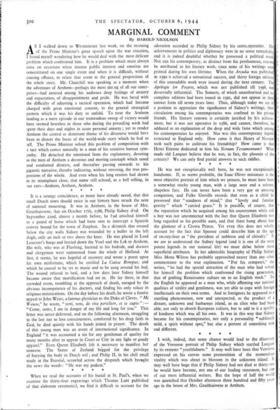He was not exceptionally well born, he was not exceptionally
handsome. if, as seems probable, the Isaac Oliver miniature is the most objective portrait of him which we possess, he must have been a somewhat stocky young man, with a large nose and a solemn, shapeless face. He can never have been a very gay or amusing companion, and Fulke Greville records that even as a child he possessed that "staidness of mind," that "lovely and familiar .gravity" which "carried grace." It is possible, of course, that the reputation which he acquired among his countrymen while still a boy was not unconnected with the fact that Queen Elizabeth was long regarded as his .possible aunt, and that there hung about him the glamour of a Crown Prince. Yet even this does not wholly account for the fact that Spenser could describe him at the age of twenty-four as "the president of noblesse and of chivalry." If we are to understand the Sidney legend (and it is one of the most potent legends in our national life) we must delve below these superficial attributes. In her admirable biography of Philip Sidney Miss Mona Wilson has probably approached nearer than any other commentator to the true explanation. "For his compeers," she writes, "he had the special attraction of the man who had solved for himself the problem which confronted the rising generation, that of grafting Renaissance culture on to an English stock." To the English he appeared as a man who, while affirming our national qualities of virility and gentleness, was yet able to cope with foreign intellectuals on their own terms. And to foreigners he appeared as a startling phenomenon, new and unexpected, as the product of a distant, unknown and barbarous island, as an alien who had been able, not only to absorb European culture, but to add to it a qualltY of kindness which was all his own. It was in this way that Sidney became for his contemporaries, not only a personality " sublimely mild, a spirit without spot," but also a portent of something new and different.


























 Previous page
Previous page